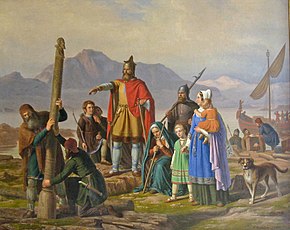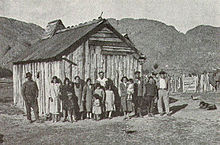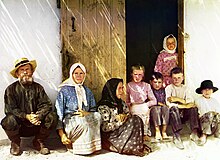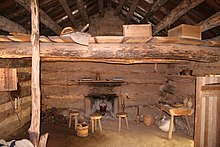
A settler is a person who migrates to a new region to establish a permanent presence there. A settler is also called a pioneer if the land that they migrated to was previously uninhabited or sparsely populated. Settlers come from a sedentary society, which has developed in a generally fixed geographical location, in contrast to a nomadic society, which does not have a fixed habitat and moves around seasonally with various settlements.
The process of settling land can be, and has often been, controversial: while human migration is a normal phenomenon by itself, it has not been uncommon throughout human history for settlers to have arrived in already-inhabited lands without the intention of living alongside the native population. In these cases, the conflict that arises between the settlers and the natives (or Indigenous peoples) may result in the dispossession of the latter within the contested territory, usually violently. While settlers can act independently, they may receive support from the government of their country or empire or from a non-governmental organization as part of a larger campaign. The lifestyle of a native population is often disturbed or destroyed if they come into contact with a settler population that seeks to replace them.
Historical usage

Many times throughout history, settlers occupied land that was previously inhabited by long-established peoples, who are designated as native or Indigenous. Additional terms may be used to describe the Indigenous peoples of the Americas and Indigenous Australians, such as Aborigines, First Nations, or Native Americans. In the United States, the terms "Indian" and "American Indian" are still common, but controversial. In order to avoid confusion with actual Indians or Indian Americans (as the Italian explorer Christopher Columbus mistakenly believed that he had arrived in India when he discovered the Americas in the 15th century), the terms "East Indian" and "Asian Indian" are also used to differentiate Indians from the Indigenous peoples of the United States.
The process by which Indigenous territories are settled by foreign peoples is usually called settler colonialism. It relies upon a process of often violent dispossession.
In the figurative usage, a "person who goes first or does something first" also applies to the American English use of "pioneer" to refer to a settler – a person who has migrated to a less occupied area and established permanent residence there, often to colonize the area; as first recorded in English in 1605. In United States history, it refers to the Europeans who were part of the process of settling new lands on Indigenous territories.
In this usage, pioneers are usually among the first to an area, whereas settlers can arrive after first settlement and join others in the process of human settlement. This correlates with the work of military pioneers, who were tasked with construction of camps before the main body of troops would arrive at the designated campsite.

The Russian Empire regularly invited Russian subjects and foreign nationals to settle in sparsely populated lands, mostly in North Asia, but also in Central Asia. These settlers were called colonists. These projects resulted in the inception of Slavo-Serbia, Volga Germans, Volhynia, and Russians in Kazakhstan, among other phenomena.
Although settlers in the early modern era frequently made use of sea routes—significant waves of settlement could also use long overland routes, such as the Great Trek by the Boer-Afrikaners in South Africa, or the Oregon Trail in the United States.
Anthropological usage
Anthropologists record the tribal displacement of native settlers who drive another tribe from the lands it held, such as the settlement of lands in the area now called Carmel-by-the-Sea, California, where the Ohlone people settled in areas that were previously inhabited by the Esselen people.
Modern usage

In Canada, the term "settler" is currently used to describe "the non-Indigenous peoples living in Canada who form the European-descended sociopolitical majority" and thereby asserting that settler colonialism is an ongoing phenomenon. The usage is controversial to some.
In the Middle East and North Africa, there are a number of references to various squatter and specific policies that are referred to as settler-oriented in nature. Among those:
- Iraq – The Ba'athist Arabization campaigns in northern Iraq, which began in 1968, resulted in the ethnic cleansing of non-Arabs, especially Kurds, who were then replaced by Arab settlers in a process that continued until the 2003 invasion of Iraq.
- Israel – large-scale immigration of Jews to Palestine began by 1882—namely to Jerusalem, Hebron, Tiberias, Safed, Jaffa, Haifa, Peki'in, Acre, Nablus, Shfaram, Petah Tikva and various other locations. By 1948, about 630,000 Jewish residents lived there, of which about 460,000 were immigrants. After the 1967 Arab–Israeli War and the Jewish exodus from the Muslim world, Jews from around the world began moving into the formerly restricted and Jordan-occupied West Bank and the formerly Egyptian-occupied Gaza Strip. Since the Israeli Declaration of Independence in 1948, more than 3 million Jews have made aliyah (lit. 'ascent'), that is the immigration of Jews from the diaspora to the geographical Land of Israel. However, the Israeli settlement is discussed in the Israeli–Palestinian peace process.
- Syria – In recent times, Arab settlers have also moved in large numbers to regions inhabited by Kurds and other ethnic minorities, such as northeast Syria.
- Cyprus – After the Turkish invasion of Cyprus in 1974, citizens of the Republic of Turkey began moving into the internationally unrecognized Turkish Republic of Northern Cyprus. Today, it is estimated that these Turkish settlers constitute around half of the population of occupied Cyprus.
- Morocco – Since the beginning of the Western Sahara conflict, citizens of the Kingdom of Morocco began moving into the Moroccan-occupied Western Sahara. The presence of these Moroccan settlers is contested by the partially recognized Sahrawi Arab Democratic Republic, which claims all of Western Sahara as its sovereign territory.
Causes of emigration
See also: Political migrationThe reasons for the emigration of settlers vary, but often they include the following factors and incentives: the desire to start a new and better life in a foreign land, personal financial hardship, social, cultural, ethnic, or religious persecution (e.g., the Pilgrims and Mormons), penal deportation (e.g. of convicted criminals from England to Australia), political oppression, and government incentive policies aimed at encouraging foreign settlement.
See also
- Chinese settlements in Tibet
- Green March
- High Arctic relocations
- Indigenous people
- Israeli settlement
- Lebensraum
- Naturalized TRNC citizens
- Phoenix Islands Settlement Scheme
- Patriot (American Revolution)
- Population transfer
- Settler colonialism
- Sooners
- Squatter
- Moroccan settlers
- Sri Lankan state sponsored colonisation schemes
- Transmigration program
- Turkish settlers in Northern Cyprus
- Virgin Lands Campaign
- Colonialism
- Gentrification
- Imperialism
- Displacement
- Oregon Trail
References
- ^ Wolfe, Patrick (December 2006). "Settler colonialism and the elimination of the native". Journal of Genocide Research. 8 (4): 387–409. doi:10.1080/14623520601056240. S2CID 143873621.
- Olson, Pamela (2013). Fast Times in Palestine. Berkeley, California: Seal Press. p. 35. ISBN 978-1-580-05483-6.
- LeFevre, Tate Etc.. "Settler Colonialism". www.oxfordbibliographies.com. Tate A. LeFevre. Retrieved 19 October 2017.
- Online Etymological Dictionary
- Greenall, Robert (23 November 2005). "Russians left behind in Central Asia". BBC News.
- Prehistoric Sources Technical Study, prepared for the city of Monterey by Bainbridge Behrens Moore Inc., 23 May 1977
- Denis, Jeffrey S. (February 2015). "Contact Theory in a Small-Town Settler-Colonial Context: The Reproduction of Laissez-Faire Racism in Indigenous-White Canadian Relations". American Sociological Review. 80 (1): 218–242. doi:10.1177/0003122414564998. S2CID 145609890.
- Robson, John (Spring–Summer 2018). "The 'Settler' Nonsense". The Dorchester Review. 7 (2): 1–2.
- "Introducing yourself as a 'settler' creates division". CBC. Retrieved 5 April 2024.
- Schneider, Jan (June 2008). "Israel". Focus Migration. 13. Hamburg Institute of International Economics. ISSN 1864-6220. Archived from the original on 14 May 2019. Retrieved 29 April 2013.
- Eliezer Ben-Rafael and Stephen Sharo, Ethnicity, Religion and Class in Israeli Society, Cambridge University Press, pages 26–27.
- Branovsky, Yael (6 May 2008). "400 olim arrive in Israel ahead of Independence Day". Ynetnews. Archived from the original on 30 June 2017. Retrieved 29 April 2013.
- Beauchamp, Zack (20 November 2018). "What are settlements, and why are they such a big deal?". Vox. Retrieved 13 April 2021.
- "Israeli Settlements". Bloomberg L.P. Retrieved 13 April 2021.
- Stefanini, Sara (31 March 2016). "Best chance Cyprus has had for peace". Politico.
- Olsen, Daniel H., and Brian J. Hill. "Pilgrimage and identity along the mormon trail." Religious pilgrimage routes and trails: sustainable development and management. Wallingford UK: CAB International, 2018. 234–246.
- Lambright, Bri. "The Ainu, Meiji Era Politics, and Its Lasting Impacts: A Historical Analysis of Racialization, Colonization, and the Creation of State and Identity in Relation to Ainu-Japanese History." (2022).
- King, Russell. Atlas of Human Migration